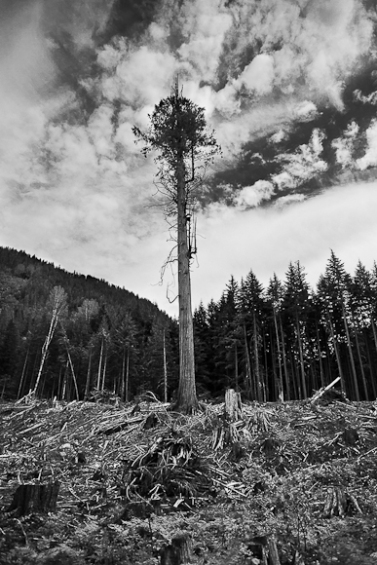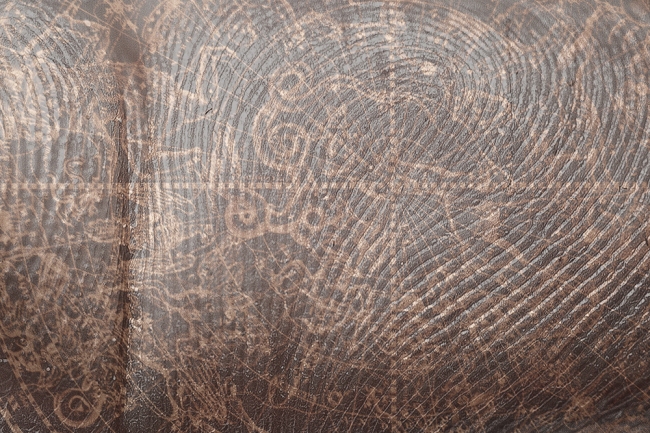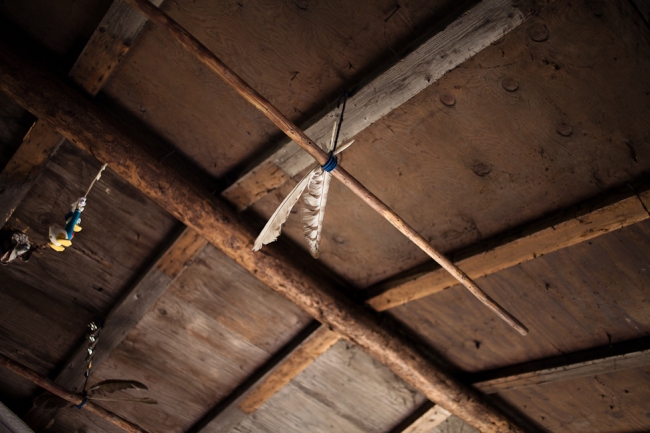He hired me to clear half an acre of his land where he wanted to later build a greenhouse for his wife. It was May and it rained most days. The earth was wet and the thin stalks of dogwood glistened at the bases of the trees. He led me to his garage, pulled down a chainsaw, and promptly began to instruct me on its use, first directing me to the alternating blades, which he taught me to sharpen one by one with a round file, then showing me how to properly oil and fuel the motor. He lent me a pair of steel-toed boots, a pair of Kevlar chaps, a helmet with a visor, and a pair of earmuffs. He took me to the woods and taught me the proper angles and the depths and the heights at which to press the roaring blade into the trees. He named the largest, one by one, distinguishing those he would harvest for firewood from those he would have me discard in a brush pile one hundred meters away. He taught me to see where the tree wanted to fall, and how to then manipulate its path to my liking. He taught me how to anticipate a pinched blade or a kickback, and how to avoid both. He taught me what he thought I needed to know and then he left me to my work.
I’ve always admired trees. I’m fond of them. It’s not unusual for me to press my hand against them as I pass by, or to climb into one and find a comfortable branch where I can sit for awhile. They become instantly familiar and by them I recall many I have known before, those I used to often climb, like the mango tree on the side of a thickly forested hill whose branches were the highways of leaf-cutter ants that would charge me angrily but assert no real threat, or the maple in the front yard when I was still a child whose tears tasted so sweet that I would scrape my tongue on its branches, believing I had discovered something magical. I’ve sat in the presence of trees that have known a thousand years or more, their bodies ascending from valley floors, reaching above waterfalls, dwarfed only by mountains. I’ve tried to imagine the passage of time from their singular perspective. I’ve tried to imagine how many of their kin have fallen around them, by our father’s hands, their bodies given for our survival, or taken for our comfort, or our pleasure, or our power.
That May, I spent a week plotting and executing the slow descent of a small forest, systematically disassembling its delicate composition, and hauling its corpses away to an unmarked grave. Trees far older than me, and far larger and stronger, fell at my will. I partitioned their bodies into manageable lengths and placed them on alternate shoulders. I felt the weight of them upon me. I felt masculine. It rained most days and my body ached, and this too felt masculine. I worked until I was exhausted, until the weight of fallen limbs bore down upon my strength, and this too felt masculine. I cut them down, young and old, until all that remained were the stumps, standing still, like gravestones to be later removed, and this too felt masculine. In the night, I dreamed the trees were angry with me. And in the morning, as I continued to cut them down, I felt both powerful and sad.
I’ve been compelled by nature all my life. Its beauty pulls at my heart. A deer passes beneath the apple tree. I see its grace and am drawn to place my hand on its shoulder. I see the hawks, still as sentries, perched in the trees and I’m drawn to know the softness of their feathers. Even the trees draw me to them, and I wonder, as I have always wondered, how to respond. For the times in my life when such compulsions felt too pastoral to entertain, I have looked cynically upon myself with the thought that although its beauty calls to me, my attraction to nature is not qualified by a sense of belonging. Beauty dwells in every unborn leaf. It emanates from the melting ice upon the lake. It moves with the deer’s every step. It is in the slow breath of trees and in the soil awakening beneath me. And I, a man, remain apart.
I was once a boy, tearing a branch needlessly from a tree. I saw its flesh, smelled the freshness of its fluids, felt at once a sense of wonder and a tinge of remorse knowing I had wounded something beautiful and innocent. And on the sidewalk, with a piece of convex glass, I held the sun against an insect in a focused beam, watched its body swell, smelt its skin burn, and felt a tyrant and a thief. And in summer’s evening light, I watched a plague of frogs rush across the gravel of a church parking lot, their tender bellies thick with coarse, dusty grit, their legs splaying with every wild leap, as they desperately fled the onslaught of emerging believers. I felt my own guilt swell as their eyes bulged and their voices burst beneath the laughter of another boy’s stomping feet – with whom I shared at least one thing in common, though the sickness in my stomach compelled me to believe that, in some ways at least, I was not like him.
The supposed nature of boys is one of aggression, dominance, and assertion. We are taught the value of competition, of skill, and of power, while tenderness and sensitivity are deemed negations from our true nature. Repressing and starving these parts of ourselves, we suffer an inability to respond with gentleness even when beauty pulls tenderly at us. And so, to the wonder of tiny creatures we respond with tyranny, and to the simple beauty of a tree we respond with destruction. But behind every display of cruelty, there must have been some confused desire to connect, to receive rather than destroy, to admire rather than take, to love rather than kill. Beneath the desire to prove our masculinity, there must have existed, within each of us, the fading memory of the femininity that bore us.
Compelled by the beauty of a tree, or by the wonder of the intricate lives of tiny creatures, we experience an innate desire to respond. And we are told that this response, even as young boys, should be inarguably masculine. But what is the masculine response to beauty? I watch the deer cross my yard and it compels me. As a man, I am taught that if something compels me, I must act, I must dominate, I must possess. Perhaps, as a man, I should pull a rifle down from above the mantel, and with one clean shot, bring the the deer to his knees, where, in his grace and his beauty, his body can bleed out, and his bowels can empty, and I can know, with certainty, that amidst all this beauty, I have a role, that I am not separate from it. Beauty calls, and I want to answer, but what do I say?
Born of a deep misunderstanding of beauty, our insecurity as men compels us to dominance, assertion, and a will to possess. Afraid that we do not belong to beauty, or that belonging to it would negate our masculinity, we take control, and in doing so invert beauty’s role in our lives. But beauty does not exist as a thing to be taken and possessed, and yet held distinctly separate from us. The masculine response to beauty is not to dominate, but to submit, to be held, to know that our own connection to beauty, which we have known since birth, is not a thing to be buried, or abandoned, or even diminished, but something to be embraced, with familiarity and without fear.
On the sixth day, when nearly all the trees had fallen and the sky was vacant and grey, and my body was tired and warm from exertion, I cut down the last of the birch. I sighted its descent carefully, started the motor of the chainsaw and removed the initial notch from the North side of the tree then came to the other side to make the final cut. The blades moved cleanly through its base and when it began to fall I calmly moved away. I felt the air move and the ground pulse as its body lay down amongst the scattered stumps. I regarded its tremendous form, no less impressive now supine than when it had stood above me. When I turned to examine the cuts I had made my heart immediately sank even as my curiosity peaked. In its stump I saw the trembling womb of an entire colony of hibernating ants. And they were beautiful, and they were doomed, and I felt masculine, and conflicted, and sad.
– C



